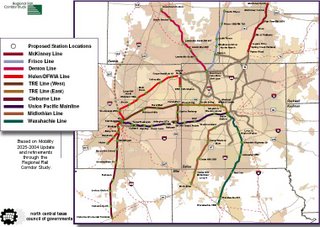
Will commuter rail ever return to Waxahachie?
According to the North Central Texas Council of Governments, the plan is to expand commuter rail to the city within the next 30 years.
With increasing growth and increasing numbers of commuters, the NCTCOG has begun looking at the future of transit rail within the North Texas region.
Along with the Dallas Area Rapid Transit, Denton County Transportation Authority and the Fort Worth Transportation Authority (The T), NCTCOG completed a comprehensive rail corridor study in 2004 that shows possible service to and from Waxahachie, through Lancaster and Red Oak.
The NCTCOG Regional Transportation Council is supporting the creation of a 260-mile rail system over the next 30 years.
A variety of technology and transportation options were considered but other than a line connecting Plano to McKinney, the council recommends the use of regional rail, currently being used on the Trinity Railway Express between Dallas and Fort Worth.
The trains can be single-level or double-level depending on the number of passengers being served.
The trains are self propelled by either Locomotive Hauled Consists or Diesel Multiple Units.
The number of stops at stations are fewer on regional rail, partially due to the speeds the trains travel at.
Passengers benefit from a maximum speed of 79 miles-per-hour.
Early projections by the council suggest a rail station in downtown Waxahachie, a station near Highway 77 and Highway 287, a Red Oak Station, Lancaster Station, an Interstate 20 station, and a Loop 12 Station, before connecting to the rest of the rail system at Union Station in Dallas.
The estimated cost for the regional rail service to Waxahachie is $266 million, compared to an estimated $1,144 million for light rail service, similar to the Interurban Rail.
The council has also suggested a separate rail line from Duncanville to Midlothian, at a cost of $170 million.
To fund the project, the council recommends cities along the corridor increasing their sales tax by at least 1/2 a cent, which would take a legistlative measure due to most cities already at the state cap for sales tax.



1 comment:
That needs to be pushed forward as much as possible. Such systems save commuters tons of money and we all might have noticed paying tons at the gas pumps, lately.
So long as they keep 'em running most of the day and night it will serve a lot of people well.
Post a Comment